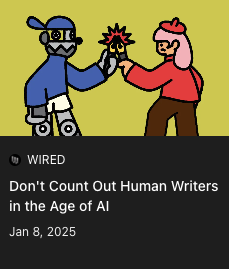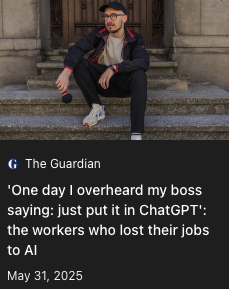1. The Short Answer: Copywriting Isn’t Dead—It’s Evolving
Far from being obsolete, copywriting is undergoing a metamorphosis. Although AI tools have disrupted the landscape, skilled copywriters are thriving—redefining their role as curators of human connection, strategic insight, and authentic storytelling.
2. Human Writing Reclaims Its Value
- A report in Wired highlights that writers’ incomes (adjusted for inflation) dropped 60.2% between 2006 and 2022, largely due to market saturation and algorithm-driven content (WIRED).
- Yet, in 2025, there’s a notable shift: audiences and brands are beginning to recognize the emotional, cultural, and strategic worth of genuine human writing—something AI lacks (WIRED).
3. AI Accelerates—But Doesn’t Replace—The Craft
- A recent study in e-commerce copy generation found that combining AI-driven prompting, fine-tuning, and post-editing can boost CTR by 12.5% and CVR by 8.3%, while maintaining originality (arXiv).
- Another study introduced an iterative refinement framework for AI-generated copy, showing success rates rising by 16–36%, and click-through improvements of 38–45% over human content (arXiv).
Takeaway: AI is a powerful engine—but not an artisan. Its best value comes when wielded by strategic, creative thinkers who guide and refine its output.
4. 2025 Copywriting Trends: Human Touch Over AI Template
a. Authenticity, Empathy & Humor
- Consumers are growing adept at detecting AI-generated content. Over 50% can spot it, and 52% report feeling less engaged when they suspect text is AI-written (OLS).
- Humour remains a potent tool: 48% of consumers say adverts with a sense of fun are especially engaging (OLS).
b. Scannability & Reader-Centric Layout
- A 73% majority of readers demand scannable content, favoring clear headings, bullet points, and short sentences (ashlynwrites.com).
- Even long-form copy can convert—one creative page reached 8.8% conversion, far exceeding the typical 3–5% benchmark—thanks to its readability and structure (ashlynwrites.com).
c. Personalisation & Brand Tone
- Hyper-personalised content is rising. 40% of surveyed companies plan to invest in data-driven personalization in 2025 (bigonwriting.com).
- Tone of voice is no longer an afterthought—it’s essential. Brands increasingly embed tone guidelines into AI tools, ensuring consistent, culturally aware messaging (bigonwriting.com).
d. Copywriters as Strategists (“Copy Orchestrators”)
- Duncan Croker envisions the modern copywriter as a “copy orchestrator”—not just writing, but coordinating AI, extracting insights, and differentiating messages in an increasingly commodified digital environment (chevronediting.com.au).
- With 37% of the global population still offline, the role of translating real-world insights into digital copy remains critical (chevronediting.com.au).
5. The Role Breakdown: Copywriting in 2025
| Role | Description |
|---|---|
| Copy Orchestrator | Guides AI tools, research, messaging strategy, and ensures differentiation (chevronediting.com.au) |
| Human Writer (First) | Writes with nuance, context, and creativity; taps into AI for editing and ideation (bigonwriting.com, OLS) |
| Prompt Engineer | Frames AI input precisely, curates initial output, blends SEO and tone-of-voice constraints (bigonwriting.com, arXiv) |
6. Regulatory & Emotional Backlash
- Human creatives are facing real displacement—like UK copywriter Annabel Beales, who lost her job when her employer switched entirely to ChatGPT for blog content (The Guardian).
- Yet AI over-reliance is prompting legal and ethical challenges—from defamation lawsuits to AI-generated fake science—reinforcing the need for human oversight and authenticity (WIRED, The Guardian).
Reimagined Copywriting Is Very Much Alive
- **AI is a tool—**not a translator of human nuance.
- Human insight, emotion, strategy, and humour remain irreplaceable.
- The future of copywriting is a hybrid: AI-powered, human-anchored.
If you’d like, I can tailor this into a blog post or webpage format, add real-world case studies, visuals, or formatting—just say the word!

